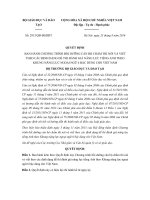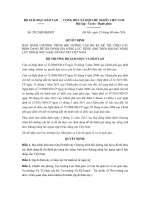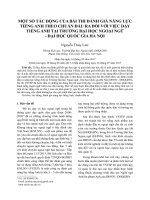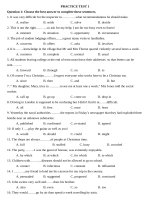PRACTICE TEST 1 đánh giá năng lực tiếng anh
Bạn đang xem bản rút gọn của tài liệu. Xem và tải ngay bản đầy đủ của tài liệu tại đây (45.07 KB, 5 trang )
PRACTICE TEST 1
Question 1: Choose the best answer to complete these sentences.
1. It was very difficult for the inspector to………….what recommendations he should make.
A. realise
B. settle
C. solve
D. decide
2. This is not the right………..to ask for my help; I am far too busy even to listen!
A. moment
B. situation
C. opportunity
D. circumstance
3. The job of student lodgings officer........a great many visits to landladies.
A. concerns
B. offers
C. asks
D. involves
4. It is …….knowledge in the village that Mr and Mrs Thorne quarrel violently several times a week.
A. common
B. complete
C. normal
D. usual
5. All students leaving college at the end of term must leave their addresses so that letters can be
sent………
A. forward
B. through
C. on
D. to
6. Of course I’m a Christian………I expect everyone who works here to be a Christian too.
A. since
B. then
C. and
D. but
7. “ My daughter, Mary, tries to………..to see me at least one a week,” Mrs Jones told the social
worker.
A. call up
B. go up
C. come on
D. drop in
8. Driving in London is supposed to be confusing but I didn’t find it at…….difficult.
A. all
B. first
C. once
D. least
9. Yesterday the naval authorities………the reports in Friday’s newspaper that they had exploded three
bombs near an unknown submarine.
A. published
B. confirmed
C. re-stated
D. agreed
C. could
D. might
10. If only I …..play the guitar as well as you!
A. would
B. should
11. The shops are always……….of people at Christmas time.
A. full
B. stuffed
C. busy
D. crowded
12. The party, ……..I was the guest of honour, was extremely enjoyable.
A. by which
B. at which
C. for which
D. to which
13. Children with………..diseases should not be allowed to go to school.
A. contact
B. infectious
C. constant
D. influential
14. I ………..my friend to lend me his caravan for my trip to the country.
A. persuaded
B. suggested
C. proposed
D. convinced
15. John swims very well and…….does his brother.
A. also
B. even
C. so
16. They would……..go by air than spend a week travelling by train.
D. too
A. always
B. rather
C. prefer
D. better
C. thought
D. puzzled
17. I have often…..why we went to live abroad.
A. wondered
B. surprised
18. My wife and I have much pleasure in ………the invitation to your daughter’s wedding.
A. asking
B. accepting
C. thanking
D. welcoming
19. Her guest apologised for causing her so much……
A. problem
B. complication
C. trouble
D. damage
20. Because his argument was so confusing,……..people understood it.
A. few
B. clever
C. less
D. many
21. Some schools have very…….rules of behaviour which must be obeyed.
A. strong
B. solid
C. straight
D. strict
22. It is…….unlikely that the Queen will agree to open the new Town Hall.
A. mainly
B. highly
C. largely
D. greatly
23. I must tell you about my …….when I first arrived in London.
A. incidents
B. happenings
C. experiences
D. events
24. In pain as a result of the fall, he……slowly home.
A. stepped
B. wound
C. limped
D. sped
25. I think he is unwell; he was complaining……….a headache this morning.
A. at
B. of
C. from
D. against
Question 2:Rewrite sentences.
1. There was never any answer when we rang.
=> Every_______________________________________________________________________
2. That's an insulting name to use for him.
=> don't call_____________________________________________________________________
3. John asked if it was the blue one or the green she wanted.
=> Which_______________________________________________________________________
4. She liked Paris very little, and Roma less.
=> She thought Rome_____________________________________________________________
5. I can meet you if you arrive before 11.
=> So__________________________________________________________________________
6. They will catch all the prisoners again by tonight.
=> All the prisoners_______________________________________________________________
7. I've warned you not to go near that dog.
=> I've warned you about__________________________________________________________
8. No, please don't tell him.
=> I'd rather_____________________________________________________________________
9. Why don't you ask her yourself?
=> I suggest_____________________________________________________________________
10. An up-to-date visa is necessary for Andorra.
=> You'll_______________________________________________________________________
Question 3: Reading Comprehension Section
The nuclear family, consisting of a mother, father, and their children, may be more an American
ideal than an American reality. Of course, the so called traditional American family was always more
varied than we had been led to believe, reflecting the very different racial, ethnic, class, and religious
customs among different American groups, but today diversity is even more obvious.
The most recent government census statistics reveal that only about one third of all current American
families fits the traditional mold of two parents and their children, and another third consists of married
couples who either have no children or have none still living at home. An analysis of the remaining one
third of the population reveals that about 20 percent of the total number of American households are
single people, the most common descriptor being women over sixty-five years of age. A small
percentage, about 3 percent of the total, consists of unmarried people who choose to live together; the
rest, about 7 percent, are single parents, with at least one child.
There are several easily identifiable reasons for the growing number of single-parent households. First,
the sociological phenomenon of single-parent households reflects changes in cultural attitudes toward
divorce and also toward unmarried mothers. A substantial number of adults become single parents as a
result of divorce. In addition, the number of children born to unmarried women who choose to keep
their children and rear them by themselves has increased dramatically. Finally, there is a small
percentage of single-parent families that have resulted from untimely death. Today, these varied family
types are typical and, therefore, normal.
In addition, because many families live far from relatives, close friends have become a more important
part of family life than ever before. The vast majority of Americans claim that they have people in their
lives whom they regard as family although they are not related. A view of family that only accepts the
traditional nuclear arrangement not only ignores the reality of modern American family life, but also
undervalues the familial bonds created in alternatives family arrangements. Apparently, many
Americans are achieving supportive relationships in family forms other than the traditional one.
1. Which of the following is the main topic of the passage?
A. The traditional American family
B. The nuclear family
C. The current American family
D. The ideal family
2. The author of would most probably agree with which of the following statements ?
A.There have always been a wide veriety of family arrangements in the United States
B.Racial, ethnic, and religious groups have preserved the traditional family structure
C.The idea Americal family is the best structure
D. Fewer married couples are having children
3.How many single people were identified in the survey?
A. One third of the total surveyed
B. One fourth of the total surveyed
C. One fifth of the total surveyed
D. Less than one tenth of the total surveyed
4.Who generally constitutes a one-person household?
A. A single man in his twenties
B. A single woman in her late sixties
C. An elderly man
D. A divorced woman
5.The passage discusses all of the following reasons for an increase in single-parent
householdsEXCEPT?
A. a rising divorce rate
B. death of one of the parents
C. babies born to single women
D. increased interest in parenting by fathers
Question 4: Read the passage and choose the option that best fits each space :
Australia School Education
Primary and secondary education in Australia are(1)… through both government and non-government
providers. State and Territory governments have major responsibility(2)...goverment school education
and contribute to (3)… for non-government schools.(4)…students enroll in government schools which
operate under the direct responsibility of the State of Territory Education Minister,(5)… the rest choose
non-government schooling. The Australian government’s role includes the provision of significant
supplementary financial (6)…to government and non-government school authorities to support agreed
priorities and strategie. Schooling is (7)…from age 6 to 15 in all states except Tasmania, where it
extends to 16. However, in most States and Territories, children (8)…primary school at the age f 5
when they enroll in preparatory or kindergarden year, after (9)…primary education continues for either
six or seven years, depending on the State or Territory. Secondary education is available for either five
or six years, depending on the State and the length of primary education. Students usually commence
their secondary schooling when (10)…12 or 13, reaching year 12 at 17 or 18
1
2
3
4
5
6
7
8
9
10
A. run
A. of
A. funds
A. Most
A. where
A. sponsor
A. compulsory
A. learn
A. that
A. age
B. delivered
B. about
B. money
B. Mostly
B. while
B. supply
B. obliged
B. prepare
B. which
B. year
C. taught
C. in
C. currency
C. Almost
C. during
C. support
C. must
C. go
C. then
C. aged
D. educated
D. for
D. program
D. The most
D. which
D. problem
D. necessary
D. start
D. what
D. at
Question 5: Put the verbs in brackets into the correct form
1. I’d rather (stay) at home than (go) out with you.
2. I’d rather you (keep) your mouth (shut)
3. The teacher suggested that every student (bring) his own meal ration
4. My father is going to have a machinist (repair) his car.
5. You will feel more confident when you (swim) for a few weeks.
6. The scientist (point out) that the book he (write) the previous year (be) already out of date
Question 6: Fill in blank with the correct form of the words given
1.
2.
The cost of … to the show is reasonable
ADMIT
My teacher is very … about the history of Vietnam
KNOW
3.
There’s too much …in this world
GREEDY
4.
He feels a great deal of … for the awful way he behaved
ASHAMED
5.
Mr. Smith is a …person. If he says he will do something, you know that he will do
DEPEND
6.
…, there are black holes in space
THEORY
7.
The results of the first experiments are very …
PROMISE
8.
The sun and the moon are often … in poetry
PERSON
9.
Sam works as a … in an office in the town centre
TELEPHONE
10.
Many children have been … of their country’s history
IGNORE









